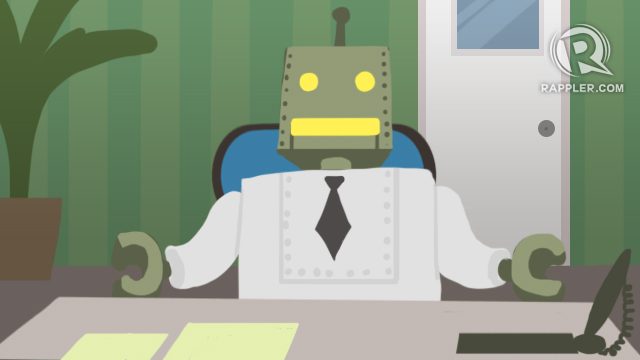SUMMARY
This is AI generated summarization, which may have errors. For context, always refer to the full article.

MANILA, Philippines – Aiming to be this year’s stand-out applicant?
Jobstreet surveyed 450 companies to learn more about opportunities for fresh grads in 2015. The results of the Jobs and Salary Report were recently released – here’s what employers said bothered them about fresh grads:
1. Hopping from one job to another
According to Jobstreet, many employers think that the fresh graduates can’t settle long enough in a job. This may be due to the fact that millennials love to try out and experiment different careers at one time.
“Fresh grads are jobhoppers – they don’t stay, they’re not loyal. Medyo mahirap sila i-full training kasi (It’s sort of hard to give full training because) maybe after 6 months, they will move on to the next job,” said Eileen Camarillo, Jobstreet’s Marketing Manager.
While job-hopping may be a trial and error experiment on the part of the (future) employee, it does take its toll on the company involved – especially considering the costs of hiring one new employee, including the training period and the equipment a new hire will be using.
In a Fortune article called “How long should you stay at a job?”, Michael O. Church says that staying for about 18 months will tell you a lot about a job.
“You survived at least one review cycle — reviews are presumed to be annual, and people aren’t reviewed until 6 months old; that’s where the 18-month derivation comes from — and had to achieve something to be retained for that long,” he wrote.
It’s a matter of balancing your own needs against the company’s. In your mind, you come first. But if you’re counting on leaving the job very soon, you may not end up being the best option for the company. (READ: 4 undeniable signs that it’s time to quit your job)
2. “Poor communication skills”

“Employers feel that our fresh grads are not articulate enough, or they don’t have that basic communication skill to express themselves properly,” said Camarillo.
Ironing out a conflict, clarifying the technicalities of a project, asking a question about a point you aren’t sure about – these are all situations you’ll encounter at work, and these are all situations requiring good communication skills.
These may not be as developed yet as a fresh grad – a point of concern and sometimes a source of conflict between a company and its new hires. Pay attention to workplace dynamics as you move forward, and read up on ways to approach tricky situations at work. (READ: I hate my boss: 5 tips to deal)
3. High expectations

“They have high expectations, usually. Unrealistic ang expectations sa salary at sa [job] position,” said Camarillo.
(They [fresh grads] have high expectations, usually. The expectations for salary and job positions are unrealistic.)
It’s not that you shouldn’t learn how to negotiate, but know also that as you acquire functional-technical skills at work, your value in the job market increases, and you’ll be better equipped to ask for a raise next time.
4. Flexibility issues

“Parang kung ano lang ang job responsibility nila na sinasabi sa ating mga employers, ‘yun lang ang gagawin ng fresh grads,” explained Camarillo, saying that many fresh grads rarely go the extra mile.
(Whatever job responsibility the employers give, that is only what these fresh grads do, and nothing more.)
In an Inc article called “5 ways to motivate yourself to work harder,” Jessica Stillman writes that instead of motivation, view work as an investment in good habits:
“Start with small habits that help you be more productive and make you feel good. For example, you could aim to walk 15 minutes a day or work in short bursts of intense focus.[…]whichever term you use, the effect is the same – automating a behavior by integrating it into your routine means you rely less on willpower.”
Remember that the employees are not meant to become robots, but are aiming to develop and grow. It might not be about just doing more work – it could be about finding new ways to do old routines or spotting more cost-efficient alternatives to whatthe company’s spending on. Often, these are discovered via someone’s fresh perspective. Why can’t it be yours?
5. Lack of professionalism

Many employers feel that fresh grads have no regard for rules in the workplace – examples of this are tardiness, improper dress code, and constant absences.
In a Business Insider article called “6 things everyone needs to stop doing at work,” Emmie Martin suggested some things to stop doing during work hours, which includes constantly unnecessarily checking social media.
“Scrolling through Instagram or catching up on your Facebook newsfeed only distracts you during the workday,” she writes.
There are other opportunities to display professionalism at work – at meetings, with other colleagues, even via your work wardrobe. Seize them all and let nothing slip through the cracks. (READ: 23 looks to update your office wardrobe)
Good luck! Find the best way to showcase your best qualities at work. Cheers to you this 2015! – Rappler.com
Add a comment
How does this make you feel?
There are no comments yet. Add your comment to start the conversation.